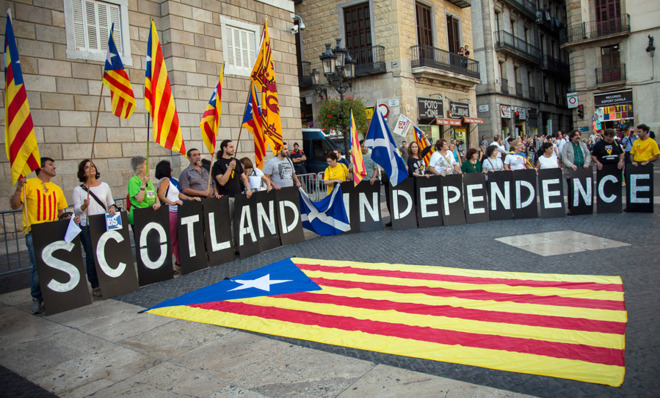The European Union was supposed to end nationalism. It gave it new life instead.
No matter how Scotland's independence referendum turns out, it's clear that nationalism is all the rage across the Atlantic


A free daily email with the biggest news stories of the day – and the best features from TheWeek.com
You are now subscribed
Your newsletter sign-up was successful
From this corner of the world, the European Union always looked a dreary German project, one that was badly anti-democratic. The way the EU made nations vote over and over again on rejected treaties until it got the answer it wanted seemed unseemly in execution and Soviet in spirit. To an American conservative, Brussels appeared to be a locus of anti-nationalism, or post-nationalism.
And that was the intent. But looking at the events of 2014, I am starting to wonder if the EU isn't the mother of a 21st-century nationalism.
Patrick Buchanan, following Jerry Mueller and others, believes Europe is on the cusp of an ethno-nationalist revolt. Of the Scottish independence vote and various other separatist movements, he writes:
The Week
Escape your echo chamber. Get the facts behind the news, plus analysis from multiple perspectives.

Sign up for The Week's Free Newsletters
From our morning news briefing to a weekly Good News Newsletter, get the best of The Week delivered directly to your inbox.
From our morning news briefing to a weekly Good News Newsletter, get the best of The Week delivered directly to your inbox.
The decomposition of the nations of Old Europe is the triumph of tribalism over transnationalism. The heart has reasons that the mind knows not, said Pascal. And the wild heart is winning. The call of blood, history, faith, culture, and memory is winning the struggle against Economism, the Western materialist ideology that holds that the desire for money and things is what ultimately motivates mankind. [The American Conservative]
There is something to this. But the situation is actually more complicated. Buchanan points to Eurosceptic parties like France's Front National and Britain's U.K. Independence Party as signs that the internationalists are losing steam. But when members of the Flemish nationalist party Vlams Belang came to visit Washington in 2007, I remember being surprised to find a few members who were reluctantly willing to take an independent Flanders into the EU.
They are not alone. Catalan separatists talk of staying in the EU, but as their own nation. The stern and doctrinaire Irish nationalists of Sinn Fein are pro-EU as well.
Do these groups not understand the threat the EU poses to their sovereignty? What gives?
It turns out that this threat has a flip side. By creating a federated superstate with its own defense policies, currency, and central bank, the EU takes off the table some of the hardest questions a separatist or secessionist movement has to answer. The EU does a lot of the work of a nation-state for them. To some degree, extant and aspiring nationalisms are free-riding on an official internationalism.
A free daily email with the biggest news stories of the day – and the best features from TheWeek.com
The EU tends to be extremely generous in dignifying minority languages, regions, and even political movements with some kind of official status. Latvian, Irish, and Maltese are all recognized European languages, but good luck finding 4 million people who speak any of these fluently. Still, this kind of recognition is important to nationalists looking to maintain some kind of identity in the face of an overwhelming, powerful neighbor, or globalism more generally.
The European project has also demanded a kind of consensus politics, what Buchanan calls "economism." Because this neoliberalism came to dominate the Europhile elite on both the left and right, it became a diverse set of targets during the economic downturn, leading to the fall of a conservative government in France and a Labour government in Britain.
As a result, as my former editor Daniel McCarthy pointed out to me, instead of ending nationalism, the Europhiles have ceded all the populist territory to nationalists on immigration, trade, or other forms of "economic patriotism." Center-left parties are suddenly more vulnerable to the left, and center-right parties, deprived of the normal expressions of patriotism, have a gaping wound on their right.
Perhaps the EU and its constellation of official nation-states sense the danger of the current formula. In the past two days, Eurocrats have been warning that it may take up to eight years for Scotland to get membership in the EU if it breaks from Great Britain. Spanish politicians, looking nervously at the Catalans, emphasize this point especially.
But Fintan O'Toole elegantly points out that the EU itself can turn very nationalist, when it is convenient. When the banks in Ireland, Greece, and Portugal went belly up at the height of the downturn, the politicians decided that it was a problem the Irish, Greeks, and Portugese had to solve, even if the banks had a distinctly European profile of assets and debts.
The Brussels elite think they are moving their continent beyond nationalism, but the EU's institutions, its paper-thin vision of politics as economistic management, and its plain bungling are giving European nationalism new life.
Michael Brendan Dougherty is senior correspondent at TheWeek.com. He is the founder and editor of The Slurve, a newsletter about baseball. His work has appeared in The New York Times Magazine, ESPN Magazine, Slate and The American Conservative.
